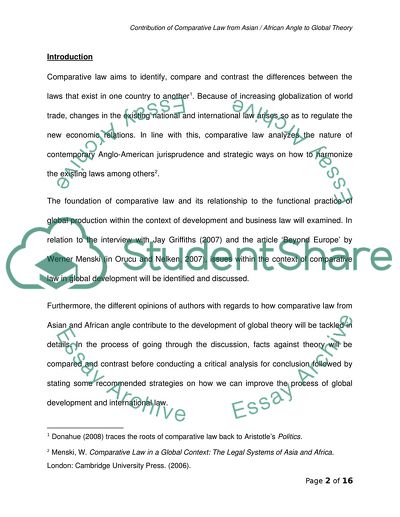Cite this document
(“Contribution of Comparative Law from Asian / African Angle to Global Literature review”, n.d.)
Contribution of Comparative Law from Asian / African Angle to Global Literature review. Retrieved from https://studentshare.org/law/1728860-consider-very-carefully-the-interview-with-the-author-and-adventure-jay-griffiths-the-metro-17072007-and-the-article-beyond-europe-by-werner-menski-in-orucu-and-nelken-2007-then-discuss-with-examples-the-following-question-in-the-assesment-criter
Contribution of Comparative Law from Asian / African Angle to Global Literature review. Retrieved from https://studentshare.org/law/1728860-consider-very-carefully-the-interview-with-the-author-and-adventure-jay-griffiths-the-metro-17072007-and-the-article-beyond-europe-by-werner-menski-in-orucu-and-nelken-2007-then-discuss-with-examples-the-following-question-in-the-assesment-criter
(Contribution of Comparative Law from Asian / African Angle to Global Literature Review)
Contribution of Comparative Law from Asian / African Angle to Global Literature Review. https://studentshare.org/law/1728860-consider-very-carefully-the-interview-with-the-author-and-adventure-jay-griffiths-the-metro-17072007-and-the-article-beyond-europe-by-werner-menski-in-orucu-and-nelken-2007-then-discuss-with-examples-the-following-question-in-the-assesment-criter.
Contribution of Comparative Law from Asian / African Angle to Global Literature Review. https://studentshare.org/law/1728860-consider-very-carefully-the-interview-with-the-author-and-adventure-jay-griffiths-the-metro-17072007-and-the-article-beyond-europe-by-werner-menski-in-orucu-and-nelken-2007-then-discuss-with-examples-the-following-question-in-the-assesment-criter.
“Contribution of Comparative Law from Asian / African Angle to Global Literature Review”, n.d. https://studentshare.org/law/1728860-consider-very-carefully-the-interview-with-the-author-and-adventure-jay-griffiths-the-metro-17072007-and-the-article-beyond-europe-by-werner-menski-in-orucu-and-nelken-2007-then-discuss-with-examples-the-following-question-in-the-assesment-criter.


